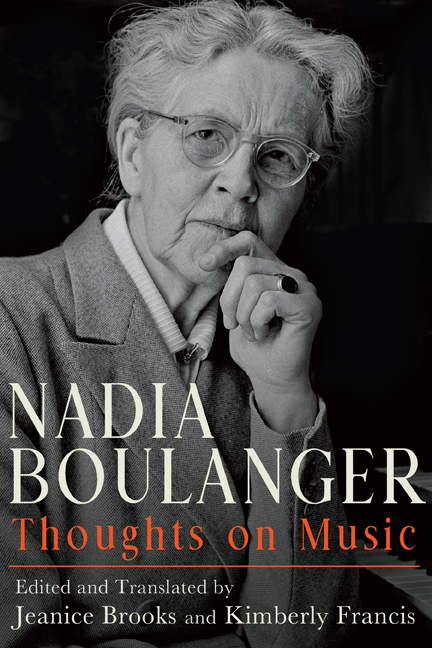Book contents
- Frontmatter
- Contents
- List of Illustrations
- Acknowledgments
- Editorial Apparatus and Critical Notes
- Note on Translations
- List of Abbreviations
- Timeline of Nadia Boulanger’s Life
- Introduction
- Part One Journalism, Criticism, Tributes
- Part Two Lectures, Classes, Broadcasts
- Bibliography of Nadia Boulanger’s Published Writing
- General Bibliography
- Index
[“On Hearing”], Lecture Notes, Unknown Event, 1940-49 (complete text)
Published online by Cambridge University Press: 15 October 2020
- Frontmatter
- Contents
- List of Illustrations
- Acknowledgments
- Editorial Apparatus and Critical Notes
- Note on Translations
- List of Abbreviations
- Timeline of Nadia Boulanger’s Life
- Introduction
- Part One Journalism, Criticism, Tributes
- Part Two Lectures, Classes, Broadcasts
- Bibliography of Nadia Boulanger’s Published Writing
- General Bibliography
- Index
Summary
The beginning listener has to be armed with immense patience for himself— and for music—because it takes a great deal of time before being able to truly hear, and I’m not even talking about being able to understand.
One can acquire a general idea, if all goes as well as possible. If everything proceeds normally, one feels nothing but confusion, pleasant or not—and this is another question [entirely].
If one is resistant to music, one has a feeling of unbearable boredom.
If one relies on it to awaken emotions, one lacks musical vitality, and the whole game is a hoax. Sensations do not always come from us; emotions rise up in us—and they are only ever at our own level.
Yet, our level, which depends on the one hand on our gift of (1) sensitivity, (2) on our taste, mostly depends on what we do with our awareness of our gift and our taste.
When popular music was
The Rosary
A Ouch Niem
Berceuse Falla
Ravel Grecques
The ear, the mind, the soul were disposed to Beauty—toward what in us seeks to be elevated: clothing, furniture, houses were varied—varied, yet each was a unit.
Mass housing represents, under the best conditions, a type of anonymity that is most annihilating destructive for one's personality.
The more you adhere to a model (in dressing, eating) in any field, the more you play the game—the more easily you can be manipulated pigeonholed, since anyone can then be replaced by someone else.
Art lends itself poorly to this type of conformism and when you are we are brought together, it is each and everyone's reaction that counts. As artists, we prefer to feel the listener's understanding or opposition, we are better rewarded by The intelligent, profound response of one single listener is better than the submission of a filled room. Faced with such submission, the artist is in danger—he’ll make use of extreme measures—he’ll achieve results, under the condition that It would be a séance of hypnotism. He would forget that his real role is one in which everyone is fully committed, fully focused on his own effort—the composer on composing, the performer on transmitting, the audience on listening, and everyone seeking one, shared goal: the work.
- Type
- Chapter
- Information
- Nadia BoulangerThoughts on Music, pp. 407 - 408Publisher: Boydell & BrewerPrint publication year: 2020



